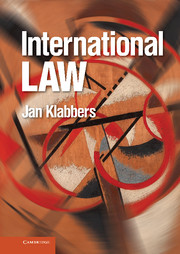Book contents
- Frontmatter
- Contents
- Detailed table of contents
- Table of cases
- Preface
- List of abbreviations
- Part I The structure of international law
- Part II The substance of international law
- Part III The surroundings of international law
- 16 Domestic courts and their relationship with international law
- 17 The politics and ethics of international law and global governance
- 18 By way of conclusion
- Bibliography
- Index
- References
18 - By way of conclusion
from Part III - The surroundings of international law
- Frontmatter
- Contents
- Detailed table of contents
- Table of cases
- Preface
- List of abbreviations
- Part I The structure of international law
- Part II The substance of international law
- Part III The surroundings of international law
- 16 Domestic courts and their relationship with international law
- 17 The politics and ethics of international law and global governance
- 18 By way of conclusion
- Bibliography
- Index
- References
Summary
In 2005, two law professors at reputed US universities published a provocative book under the title The Limits of International Law. The book, hugely disappointing as it was, suggested that international law was often epiphenomenal, meaning that states only use and adhere to international law when the law tells them to do what they already want to do at any rate, whereas it is rarely able to get states to change their ways. The current book has, it is hoped, suggested that much of this particular thesis is simply mistaken; states create international law for a variety of reasons (ranging from enlightened self-interest to altruism or moral outrage), and often enough adhere to its prescriptions. Moreover, international law offers a vocabulary for political debate; discussions on what to do if one state invades another, or when a succession of states occurs, or when large-scale pollution takes place, would be decidedly different in tone without the international legal framework providing a vocabulary and providing channels for communication and a platform for decision-making.
Yet there are limits to what can legitimately be expected from international law, and perhaps the main limit should be obvious. International law depends to a very large extent on underlying political agreement between the relevant actors. If the world's politicians are hopelessly divided on what to do on any given topic, these divisions are unlikely to result in coherent and effective legal rules. Perhaps the best illustration hereof is the ICJ's opinion on the legality of nuclear weapons; as this has divided states since the 1940s, it should not come as a surprise that the ICJ could not find a clear legal rule governing the topic, and could hardly have said more than its delphic statement that nuclear weapons are generally illegal except in extreme circumstances of self-defence. In other words, nuclear weapons are illegal, except when they are legal.
- Type
- Chapter
- Information
- International Law , pp. 315 - 318Publisher: Cambridge University PressPrint publication year: 2013



